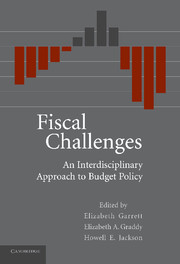Book contents
- Frontmatter
- Contents
- Preface
- Contributors
- PART ONE THE LAW AND POLITICS OF FISCAL POLICY
- PART TWO UNDERSTANDING FEDERAL DEFICITS AND PUBLIC DEBT
- 5 Economic Perspectives on Federal Deficits and Debt
- 6 Counting the Ways: The Structure of Federal Spending
- 7 Starving the Beast: The Political Psychology of Budget Deficits
- Part Two Bibliography
- PART THREE BUDGETING AND FISCAL CONSTRAINTS AT THE STATE LEVEL
- PART FOUR INTERGOVERNMENTAL ASPECTS OF BUDGET POLICY
- PART FIVE JUDICIAL POWERS AND BUDGET POLICY
- Index
6 - Counting the Ways: The Structure of Federal Spending
Published online by Cambridge University Press: 23 December 2009
- Frontmatter
- Contents
- Preface
- Contributors
- PART ONE THE LAW AND POLITICS OF FISCAL POLICY
- PART TWO UNDERSTANDING FEDERAL DEFICITS AND PUBLIC DEBT
- 5 Economic Perspectives on Federal Deficits and Debt
- 6 Counting the Ways: The Structure of Federal Spending
- 7 Starving the Beast: The Political Psychology of Budget Deficits
- Part Two Bibliography
- PART THREE BUDGETING AND FISCAL CONSTRAINTS AT THE STATE LEVEL
- PART FOUR INTERGOVERNMENTAL ASPECTS OF BUDGET POLICY
- PART FIVE JUDICIAL POWERS AND BUDGET POLICY
- Index
Summary
In the realm of budget policy, numbers are important. The size of the deficit, the level of public debt, and a handful of commonly cited ratios all have great political salience in budgeting decisions. When the Congressional Budget Office (CBO) issues a report or the president unveils his annual budget proposal, these actions immediately are evaluated by reference to key budgetary measures. These measures are based on particular accounting principles, most of which were developed decades ago with minor adjustments over time. Accounting principles are not, however, immutable. Other principles apply in other jurisdictions and indeed different principles are applied in assembling the Financial Reports of the United States Government, to which neither the general public nor budget experts pay much attention. The question I explore in this chapter is whether we should move toward different methods of accounting – methods more similar to the rules of accrual accounting applied in other sectors of the economy – to inform public debate over federal budget policy.
The structure of my analysis is straightforward. First, I review the key measures of fiscal performance that currently frame federal budget policy, examining both the content of these measures themselves and the principal reasons why these measures are thought to be relevant to public understanding of fiscal matters. I then identify several important aspects of our federal government's fiscal affairs that are not captured in these standard measures.
- Type
- Chapter
- Information
- Fiscal ChallengesAn Interdisciplinary Approach to Budget Policy, pp. 185 - 220Publisher: Cambridge University PressPrint publication year: 2008
- 4
- Cited by



